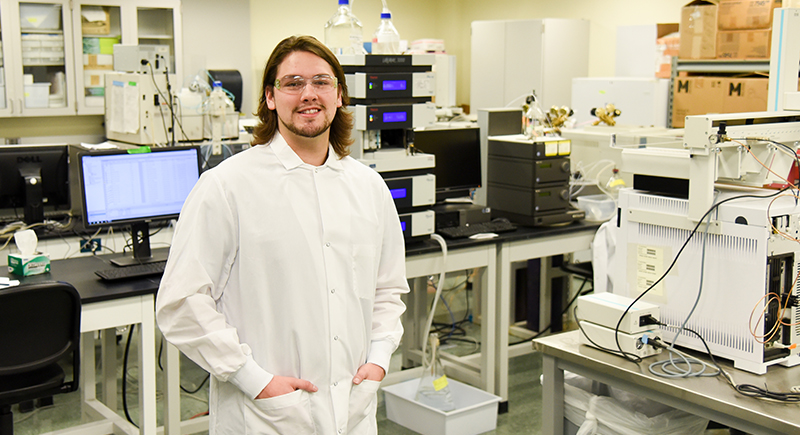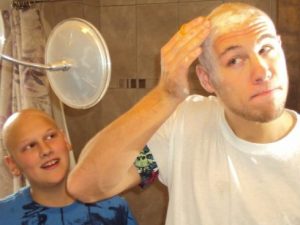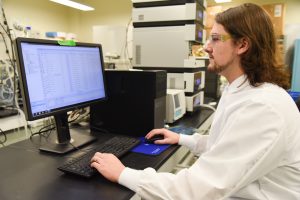
December 5, 2017 Alumnus using biology degree to combat cancer through internship at PNNL
By Maegan Murray, WSU Tri-Cities
RICHLAND, Wash. – Vincent Danna (’17) was in middle school when he lost all of his hair.
He suffers from a condition known as alopecia universalis, which is when the immune system mistakenly attacks the hair follicles. His personal struggle led him to want to become a dermatologist and help those who experience serious skin diseases and other ailments.

Vincent Danna’s brother (right) decided to shave his head in support of Vincent when he lost all of his hair in middle school.
“It sounds silly,” he said, “but my experience really spiked my interest in wanting to help other people through medicine.”
His passion led him to pursue a degree in biological sciences at Washington State University Tri-Cities, which in turn helped him land an internship at the Pacific Northwest National Laboratory (PNNL). He continues to conduct cancer research with the computational biology group at PNNL.
He plans to use both experiences to get into a good medical school so that as a doctor, he can help others with similar and more serious medical conditions.
Real-world cancer research
At PNNL, Danna and his colleagues are analyzing ovarian cancer data in order to digitally categorize the productivity of what are called kinases. Kinases are enzymes within a cell that modify proteins and play a major role in the process of cell division.
Under the supervision of his PNNL mentor, Jason McDermott, Danna’s research focuses on identifying whether certain kinases are significantly overregulated or underregulated within cancer cells, which could demonstrate how kinases lead to the formation of malignant tumors. Targeting dysregulated kinases, he said, has the potential to stop the spread of the cancer, or to prevent it from developing altogether.

WSU Tri-Cities alumnus Vincent Danna
This spring, the team analyzed kinase data from 69 ovarian cancer patients. Danna said their results are promising.
“Cancer is essentially the over-replication of cells,” Danna said. “Chemotherapy targets fast-growing cells, but that can affect the whole body, as well as normal cells, which is why patients typically lose their hair. With our research, we hope to target something more specific, like a kinase or a gene.”
In the future, he said individuals may be able to take a drug or another inhibitor to suppress or better regulate those kinases.
“Targeted therapy is recognized as being one of the healthier and more beneficial methods in treating patients with ovarian cancer,” he said.
Danna and his colleagues at PNNL are now investigating whether dysregulated kinases have implications for phenotypes. Phenotypes are an organism’s gene-expressed observable characteristics, such as hair color. The outcome could help predict a patient’s lifespan and ability to fight ovarian cancer.
“The goal of that research is improving that patient’s quality of life and and to give them a better estimation of what they’re dealing with,” he said.
Additionally, Danna and other PNNL researchers are using similar processes to examine patient resistance or sensitivity to a type of cancer treatment called platinum therapy. The therapy uses platinum compounds to produce changes in the DNA structure as a way of treating specific cancers, including ovarian cancer.
Medical school and beyond
Danna said his science and statistics courses at WSU Tri-Cities gave him the ideal foundation for being successful with his work at PNNL. He said gaining the biological knowledge, as well as developing the statistical analysis skills to understand the computational side of writing code and programming through his internship, is what gave him the background to be successful with his position at PNNL.
Combining his academic knowledge with the opportunity to work on research that has real-world medical applications, has given him a realistic look at how medical research is done, and as a result, is experience he can someday use as a doctor, he said.
“It feels good that the research I’m completing will hopefully make a difference in the lives of future cancer patients,” he said.
Danna plans to take the Medical College Admission Test this spring and apply to medical schools soon afterward. He is currently considering the WSU Elson S. Floyd College of Medicine as an option.
Looking to the future, he is excited to lead his own medical initiatives that one-day might positively impact the lives of patients.
“I know what it’s like to suffer from a condition that can affect your physical and even emotional well-being,” Danna said. “I hope to make a difference in the lives of my own patients, someday.”





